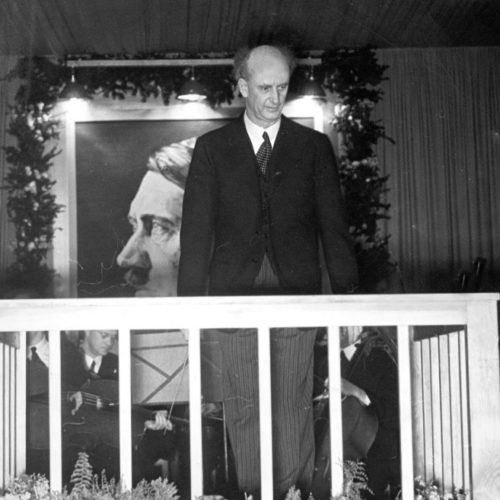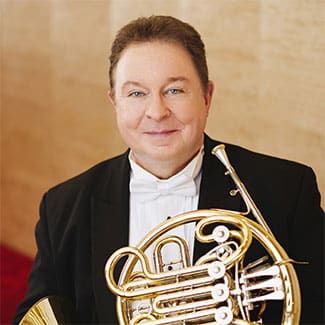Daniel Barenboim: I don’t believe Beethoven was interested in politics
Why BeethovenFrom a Barenboim essay in the NY Times today on the bicentenary of Beethoven’s 9th symphony:
… I don’t believe, however, that Beethoven was interested in everyday politics. He was not an activist.
Instead, he was a deeply political man in the broadest sense of the word. He was concerned with moral behavior and the larger questions of right and wrong affecting all of society. Especially significant for him was freedom of thought and of personal expression, which he associated with the rights and responsibilities of the individual. He would have had no sympathy with the now widely held view of freedom as essentially economic, necessary for the workings of the markets.
The closest he comes to a political statement in the Ninth is a sentence at the heart of the last movement, in which voices were heard for the first time in a symphony: “All men become brothers.” We understand that now more as an expression of hope than a confident statement…
Discuss.
pictured: Furtwängler conducts Beethoven as propaganda







there’s really no point in reproducing these two existing Furtwängler images over and over again … it’s also against art and music. everyone knows that Furtwängler was forced into it, he was never a Nazi (listen to the Horenstein interview). Otherwise he would have been in dramatic circumstances for himself and many musicians and colleagues (such as his Jewish secretary). And he very often refused, he suffered as a result – this is all very well known. You can’t make him out to be a bad person.
“Bad person’ no he was not. Complicit he was. . . as were many both within and without the arts.
And what have you done these days, to resist the unjust and wrong in your country? Which is not even suffering under totalitarian rule, not posing any immediate threat for life and family for you, which should make it a million times easier for you!
Let us know, what did you do, before judging others under much moire dire circumstances.
Ah yes, the old basic tenet of criminal law: only perfect angels are allowed to raise complaints/accusations.
This is not about criminal law. This is about claiming the moral high road. People who have not been challenged under comparable circumstances to act themselves to the highest moral standards, have simply no authority to judge. Everybody is free of course to have an opinion. But it doesn’t matter much.
Sure, Furtwangler was complicit, that’s why Goebbels hated him so much.
I advise you to watch the film “Taking Sides”.
The play was better and at the time there was no woke movement
Totally true, Furti and Dani. Furtwängler was never complicit in anything. As the foremost German conductor in his time, he openly resisted any Nazi attempts to recruit him to their cause – indeed, he was a thorn in their flesh, made many gestures of defiance and had to flee towards the end of WWII because the Gestapo were about to arrest him.
Anyone who has any doubts about him should read ‘The Baton and the Jackboot’ by Berta Geissmer, his Jewish secretary, and Sam H. Shirakawa’s exhaustive biography ‘The Devil’s Music Master’.
I read the Geissmer book, which is fantastic. He got into trouble indeed and suffered from bad conscience as well, after all he was in an impossible situation.
Yeah, he was “forced into it” and six million people were put in gas chambers and all those good citizens said they didn’t see anything. It’s similar to how the US military has killed over 4 million since WWII in illegal, unjust wars and it means nothing to the country’s citizens so nothing is done about it.
Yes, the USA is as bad as the nazis, probably even worse. Everybody knows that. This is the reason that there are always protest rallies against the USA and never against North Korea, Iran, Russia, China, Hamas – because the real danger to the world is America.
Your words, not mine. But yes, among the family of nations, so to speak, between Europe and the USA, there is a close exchange of ideas and protests. About time, for example, for one about the presumably liberal progressive Dutch who elected the racist xenophobe Geert Wilders as the head of the country.
The number of fools who like Wilders in the Netherlands is a very different problem from the regimes of insane criminals of Russia, N-Korea, Iran, etc.
Pointing the finger at other countries to deflect from your own, and to deflect from the troubled history of classical music in the 20th century.
The troubled history of classical music in the 20th century is a Western problem, due to the crumbling Grand Narrative of Progress and Technology. When Western sources are rediscovered, classical music will come back in its own worth. It is not the music, it is the nature of society.
In reference to my previous comment, think about what the few in the resistance actually did, such as the White Rose, think of Sophie Scholl being beheaded, think of Karl Amadeus Hartman going into “internal exile, and then ask if regularly conducting the Vienna and Berlin Philharmonics all over Germany and Austria in propaganda concerts was really resistance. Do we live in a time when that is an example moral commitment we should follow? It was an extraordinarily difficult and dangerous time and it is difficult to judge people’s actions in such circumstances, but I wonder if we are too tolerant of the some of the comprises people made. And I wonder if that sort of flexibility might be why we are seeing some of the problems we do today.
If Furtwangler was complicit then so was Richard Strauss. Are you going to stop listening to R. Strauss?
We listen to both aware of their history context and moral compromises with the hope that the understanding gained will help build a better future.
“Especially significant for him was freedom of thought and of personal expression, which he associated with the rights and responsibilities of the individual.”
The individual has the right to get woke, or banned/cancelled/taken by the Pride Police:
“All men become brothers.”
I guess the Eroica Symphony (first dedicated to Napoleon) doesn’t count as do his numerous dedications to patrons who were part of the political system in Vienna during his lifetime.
These patrons were mostly sponsors…
He had to manouevre between his urge for freedom and keeping his patrons on board, which were enlightened nobels with a serious interest in music – among which the brother of the emperor, the arch bischop (who played the piano very well and composed some nice music). Of course they knew about B’s political sympathies and accepted them, as long as he did not gather armed gangs and stormed their palaces. In fact, B felt himself equal to the nobles. So, B’s political opinions were, to say the least, complex and contradictory.
Well, LvB withdrew his dedication to Napoleon of his 3rd Symphony, the Eroica. If that is not a political statement, then I don’t know what one is.
Correct. The 3rd is a political statement in terms of emotions and moods, but without the dedication the music has become universal and not about Napoleon.
Also the 5th has hidden political messages but again, made universal.
…and he was decidedly republican; he hated royalty and the nobility – except, of course, those who sponsored him financially, such as Archduke Rudolf, Prince Lobkowitz and other such figures. On the other hand, there are the two early cantatas on the death of Joseph II and the coronation of Leopold II.
As for ‘the closest he came to a political statement’ being in the last movement of the ninth symphony’, where he asserts the brotherhood of mankind, what about the whole of Fidelio, where he champions the cause of justice and freedom? Then there’s ‘Wellington’s Victory’, a piece of decidedly anti-French and anti-imperialist jingoistic propaganda. Regarding the brotherhod of man, there’s the delightful Bundeslied, possibly suggesting Beethoven’s sympathy with the ideals of Freemasonry.
Finally, there’s the late, very littie-known, large-scale cantata ‘Der glorreiche Augenblick’, written to celebrate the opening of the Congress of Vienna and surely a declaration of the ideals of the EU!
“What you are, you are by accident of birth; what I am, I am by myself. There are and will be a thousand princes; there is only one Beethoven.” – LvB
There are plenty of Beethoven pieces with a clear political connection. Fidelio, to start with. The Eroica. “Wellington’s Victory”, a direct comment on a very recent battle. The cantata for the Congress of Vienna. The list goes on. There is a lot of Beethoven music inspired by “everyday politics”…
I has always read that Beethoven was in the favor of the ideals of the french revolution, that in was an admirer of Bonaparte but that he was rebuffed when Napoleon crowned himself Emperor. If it’s not “politics”, what it is ?
Not rebuffed by Napoleon, surely; when he heard that Napoleon had crowned himself Emperor, he flew into a rage and scratched out the dedication to Napoleon of the ‘Eroica’ symphony.
Barenboim got it wrong.
‘Alle menschen werden Brüder’ is followed by ‘… wo dein sanfter Flügel weilt’, so there’s a caveat: where people are already full of joy, then they will become brothers.
Also, people who cannot join-in, better get lost:
“Und wer’s nie gekonnt, der stehle
Weinend sich aus diesem Bund!”
(And he who never managed it, should slink weeping from this union!)
That means: you first must have been touched by this eternal, spiritual joy of being, and THEN you will recognize all other people as brothers, and if you cannot plunge into the heavenly joy you better leave the festive crowd. So, it is quite conditional.
How such a subject can be political is a mystery to me.
At his best, Barenboim has plenty of meaningful things to express. He is at his best at the piano and at the conductor’s podium.
…except for that whole obsession with Napoleon and frequent references to the French Revolution.
What in the world is Barenboim talking about? This is simply objectively false.
Why have you misquoted Barenboim for your headline when his article explicitly says (in exact words) “he was interested in politics”. Are you being deliberately dishonest or did you not read the article?
He says specifically in the article: I don’t believe, however, that Beethoven was interested in everyday politics.
Take your dishonest pedantry elsewhere, please.
Andy was being neither dishonest nor pedantic. You left out a key word in your headline: “everyday”. I don’t know if Barenboim is right; I am in the midst of Swafford’s extraordinary Beethoven biography and there seems to be evidence on both sides. But in any case, one can have general, even passionate views on politics and not be caught up in the day-to-day political machinations.
Your judicious edit changed the meaning of what DB said and amounts to a misquote. Many of the comments here are by people who read the headline but clearly didn’t bother to read what the man actually wrote.
I am not going to argue with you, Max. He was pretty much contradicting himself in a piece that was evidently a collection of thoughts, dictated rather than written. A headline is a crude medium. You have to choose one meaning or another.
No, you don’t have to. You made a choice. Stand by your choice and defend it. The headline could have easily taken the one additional word you left out. You chose to not put it in. You are a serial offender with this sort of stuff, and I think we all know why.
It’s not pedantry when you choose to write a headline that pretends Barenboim doesn’t believe Beethoven was interested in politics, but Barenboim literally writes “he was interested in politics”. That just makes you wrong. Either delivery or accidentally, neither of which looks good.
*deliberately, not delivery.
Why not photos of Gergiev with Putin?
Politicians using Beethoven for propaganda has nothing to do with Beethoven being interested in politics, so the photographs are irrelevant. In any case, what were everyday politics in Vienna in Beethoven’s time? It was hardly a parliamentary democracy.
However, Beethoven did once express the view that it was better to be thought a tyrant than a feudalist (in relation to using the metronome).
Before the Metternich regime (after Napoleon’s fall), the Habsburg Empire was a relatively free society, with a lot of arts and music going-on, and Vienna as a very lively artistic metropole where the court mixed freely with artists and the emperor had a serious interest in music (if it had not ‘too many notes’). Enlightenment ideas were, to some extent, put into practice from above, quite extraordinary (especially by Joseph II), in spite of them being sabotaged by the expected interest groups (nobles, civil servants).
Exactly – lots of artistic activity and indeed discssion of enlightenment and post-enlightenment ideas – but that is not ‘everyday politics’. Barenboim’s definition of ‘deeply political in the broadest sense’ is so broad as to be meaningless.
“He was concerned with moral behavior and the larger questions of right and wrong affecting all of society…”
HA! tell Karl’s mom about it. Whilst trying to get custody, Beethoven resorted to immoral and illegal means of forging court documents and making false accusations against his late brother’s widow. A complete hypocrite, both religiously and morally.
A great musical genius nonetheless, but a lousy human being.
B’s pbsession with his nephew has been the subject of many studies, and the most convincing conclusion appears to be that, after many vain attempts of relationships (and thus, having a family of his own), he tried to be father to an imagined son. Also this misfired, he being entirely unsuited for fatherhood. That did not make him a ‘complete hypocrete, both religiously and morally’.
If anything undermined his highminded ideas about humanity it was his great difficulty of bringing his humanist ideas in practice with unsophisticated housekeepers who had great difficulty with dealing with an eratic and deaf lord.
“He would have had no sympathy with the now widely held view of freedom as essentially economic, necessary for the workings of the markets.”
That’s the salient bit. He would have been repulsed by the modern conservative.
Judging from tonight’s performance of Beethoven 9th at the Musikverein, impeccably played by the Vienna Phil., with a great choir and great singers, Riccardo Muti thinks the work is above all a metronomic question. Nothing moved on, specially in the faster movements. A sense of monotony was palpable from the first bars of the first movement. No politics here, nor anything else, except perhaps a somewhat military operation.
Your headline cuts one important word.
Certainly, LVB had SOME interest in politics. Supposedly, he dedicated his 3d to Napoleon; then he promptly re-dedicated it to those who fought against Napoleon after the French took Vienna. So his political views were probably vague and shallow.
Little-known fact: the “Eroica” symphony was originally the “Erotica”, but when LvB furiously erased the dedication to Napoleon, who he secretly desired as a repressed homosexual, he accidentally erased the “t” from the title as well. In view of this, one can see the first movement as a depiction of furious love-making that is yet unable to achieve a true climax, the second as the post-coital depression of a frustrated and impotent rapist, the third as the recuperation of the raging male libido and the fourth as the return of the toxic masculine which eternally seeks to dominate the oceanic feminine in order to mask its incipient impotence and violently impose its binary strata over fundamentally non-binary structures. Brought to you by the Susan McClary Genderqueer Collective.
I always suspected that! But people told me I projected my own frustrations in the piece. Now it has been proven I am really musical, after all!
Sally